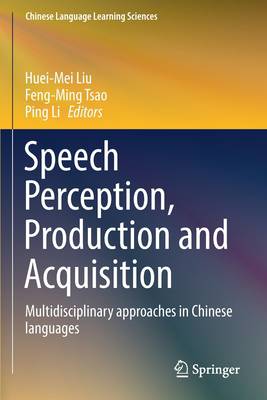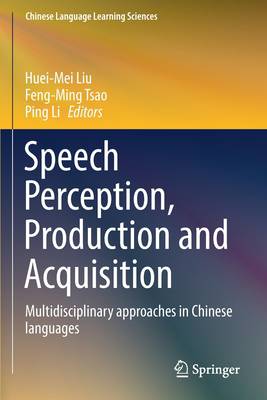
- Afhalen na 1 uur in een winkel met voorraad
- Gratis thuislevering in België vanaf € 30
- Ruim aanbod met 7 miljoen producten
- Afhalen na 1 uur in een winkel met voorraad
- Gratis thuislevering in België vanaf € 30
- Ruim aanbod met 7 miljoen producten
Zoeken
Speech Perception, Production and Acquisition
Multidisciplinary Approaches in Chinese Languages
€ 244,45
+ 488 punten
Omschrijving
1. Introduction.- Part 1: Acoustics, Perception, and Production of Lexical tones (in Adults).- 2. The Phonetic Realization of Mandarin Phoneme Inventory: The Canonical and the Variants.- 3. Acoustic-based and Knowledge-based Processing of Mandarin Tones by Native and Non-native Speakers.- 4. Individual Differences in Lexical Tone Learning.- Part II: Neural Representations.- 5. Native and Nonnative Processing of Acoustic and Phonological Information of Lexical Tones in Chinese: Behavioral and Neural Correlates.- 6. Neurophysiological Studies of Mandarin Lexical Tone Acquisition in the Early Childhood.- 7. Neural Processing of Tone Sandhi in Production and Perception: The Case of Mandarin Tone 3 Sandhi.- Part III: Domain-General Transfer and Cross-Modal Integration.- 8. The Effect of Musical Experience and Congenital Amusia on Lexical Tone Perception, Production, and Learning: A review.- 9. Multi-modal Perception of Tone.- Part IV: Development from Infancy through Childhood.- 10. Lexical Tone Perception Development in Infancy.- 11. Early Word Recognition and Word Learning in Mandarin Learning Children.- 12. Speech Development in Mandarin-Speaking Children.- 13. Behavioral and Neurophysiological Evidence of Speech Processing in Chinese-Speaking Individuals with Autism Spectrum Disorder: A Review and Future Directions.
Specificaties
Betrokkenen
- Uitgeverij:
Inhoud
- Aantal bladzijden:
- 279
- Taal:
- Engels
- Reeks:
Eigenschappen
- Productcode (EAN):
- 9789811576089
- Verschijningsdatum:
- 16/09/2021
- Uitvoering:
- Paperback
- Formaat:
- Trade paperback (VS)
- Afmetingen:
- 156 mm x 234 mm
- Gewicht:
- 408 g

Alleen bij Standaard Boekhandel
+ 488 punten op je klantenkaart van Standaard Boekhandel
Beoordelingen
We publiceren alleen reviews die voldoen aan de voorwaarden voor reviews. Bekijk onze voorwaarden voor reviews.






